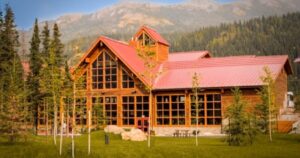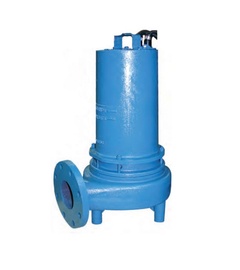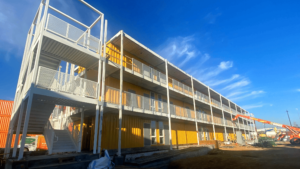
The world has witnessed numerous industries experience significant transformations due to economic fluctuations, technological advancements, and changes in consumer behavior. One such industry that has been greatly impacted by the oil and gas sector is the hotel industry. The correlation between oil and gas valuation and the growth of hotels is a fascinating tale of interconnectedness, resilience, and adaptation. In this article, we will delve into how oil and gas valuation has influenced the hotel industry, reshaping its landscape, and driving innovation.
Historical Context
To understand the profound influence of oil and gas valuation on the hotel industry, we must first explore the historical context of this relationship.
The Energy Boom
The oil and gas industry has been instrumental in powering economies and shaping global business dynamics for over a century. The discovery of oil reserves, particularly in the Middle East, led to an energy boom that altered the economic landscape worldwide. The boom brought about substantial revenue for countries with vast reserves and created a domino effect on various sectors, including hospitality.
Transportation and Tourism
As oil and gas became more readily available, the cost of transportation decreased, making travel more accessible and affordable for the masses. The advent of commercial aviation and the development of efficient, fuel-efficient automobiles contributed to this trend. With easier and cheaper transportation options, the tourism industry began to expand rapidly, leading to an increased demand for hotels.
Economic Impact on the Hotel Industry
The economic impact of oil and gas valuation on the hotel industry has been significant. Here are some key factors to consider:
Economic Prosperity
Increased oil and gas revenue for oil-producing countries created economic prosperity. This, in turn, led to an increase in business travel and tourism. The rising wealth of these nations meant that more people were traveling for both leisure and business purposes. Hotels, therefore, had to expand their services and facilities to meet the demands of these high-spending travelers.
Investment in Infrastructure
Oil-rich nations often reinvested their profits into infrastructure development. This included the construction of airports, highways, and tourist attractions. Hotels near these facilities experienced a surge in demand, as they provided convenient accommodations for travelers.
Influence on Energy Costs
The cost of energy, a significant operating expense for hotels, fluctuated in tandem with oil prices. When oil prices were low, hotels benefited from reduced energy costs, resulting in improved profit margins. Conversely, when oil prices surged, hoteliers had to strategize to mitigate the impact on their bottom line.
Technological Advancements
The symbiotic relationship between the oil and gas industry and hotels also spurred technological advancements within the hospitality sector:
Energy Efficiency
High energy costs prompted hotels to innovate in terms of energy efficiency. This led to the development of sustainable practices, including the use of renewable energy sources, energy-efficient appliances, and improved building insulation. These innovations not only reduced operating costs but also attracted eco-conscious travelers.
Technological Integration
As the oil and gas industry continued to evolve, so did technology. The integration of digital technology into the hotel industry transformed guest experiences. Online booking platforms, keyless entry systems, and personalized service apps are examples of how hotels leveraged technology to enhance their services, making them more appealing to a new generation of travelers.
Globalization and Diversification
Oil and gas valuation’s influence on the hotel industry extends to globalization and diversification:
Expansion of Hotel Chains
As travelers from oil-rich nations explored the world, global hotel chains expanded their reach to cater to this growing market. Hotels began to establish properties in regions with strong economic ties to the oil and gas industry, such as the Middle East, resulting in the globalization of the hotel sector.
Specialized Services
The influx of international guests also led to the diversification of hotel services. Some hotels tailored their offerings to cater specifically to the needs and preferences of oil and gas professionals, including extended-stay accommodations, meeting facilities, and on-site dining options that catered to various international cuisines.
Adapting to Market Volatility
Oil and gas valuation is notorious for its volatility, and the hotel industry has had to adapt to these fluctuations:
Revenue Management
To counter the impact of fluctuating oil prices, hotels adopted sophisticated revenue management strategies. These systems allowed hotels to adjust room rates based on market demand, helping them maximize profits during periods of high demand and stay competitive during downturns.
MICE Industry
The Meetings, Incentives, Conferences, and Exhibitions (MICE) industry, which often relies on oil and gas-related events and conferences, became a significant source of revenue for hotels. Many hotels established state-of-the-art meeting facilities to cater to the needs of corporate clients, further diversifying their income streams.
Sustainable Practices and Consumer Preferences
As global awareness of environmental issues grew, the oil and gas industry’s environmental impact came under scrutiny. This, in turn, influenced consumer preferences and the hotel industry’s response:
Environmental Responsibility
Environmental sustainability became a key concern for travelers. Hotels began implementing eco-friendly practices to attract environmentally conscious guests. The focus on sustainability extended to construction and operations, with many hotels seeking green certifications.
Renewable Energy Integration
Some hotels incorporated renewable energy sources, such as solar panels and wind turbines, to reduce their carbon footprint. This not only aligned with the shift towards renewable energy in the oil and gas industry but also appealed to travelers who sought eco-friendly accommodations.
The Pandemic’s Impact and Resilience
The COVID-19 pandemic had an unprecedented impact on both the oil and gas industry and the hotel sector. The two industries faced distinct challenges but also showcased resilience:
Oil Price Crash
The pandemic led to a historic collapse in oil prices due to reduced demand. This affected the economies of oil-producing nations and subsequently impacted international travel and the hotel industry. Business travel came to a near standstill, and many hotels faced reduced occupancy rates.
Adaptation and Recovery
Despite these challenges, hotels adapted to the new normal. They implemented enhanced cleaning protocols, contactless check-in, and flexible cancellation policies. As travel restrictions eased, hotels began to recover, and new trends, such as remote workcations and staycations, emerged.
The Future of the Hotel Industry
As the world continues to grapple with the ongoing effects of the pandemic and transitions toward a more sustainable future, the hotel industry is poised for further transformation:
Sustainable Practices
Sustainability will remain a focal point for the hotel industry. Expect to see more hotels investing in renewable energy, reducing waste, and adopting responsible sourcing practices.
Technology Integration
Technology will continue to drive innovation within the hotel sector. Artificial intelligence, data analytics, and automation will be used to enhance guest experiences and streamline operations.
Diversification and Niche Markets
Hotels will continue to diversify their offerings to cater to niche markets, including eco-tourism, wellness travel, and digital nomads. Customized experiences will become increasingly common.
Pandemic Preparedness
The pandemic has underscored the importance of crisis preparedness. Hotels will invest in systems and protocols to respond to future crises while ensuring the safety and well-being of guests.
Conclusion
The interplay between oil and gas valuation and the hotel industry is a testament to the dynamic nature of business environments. From historical economic booms to technological innovations, globalization, and environmental consciousness, these two industries have evolved in tandem. The hotel industry’s resilience in the face of market volatility and global crises highlights its adaptability and commitment to serving the needs of travelers.
As we look to the future, the hotel industry will continue to evolve, embracing sustainability, technology, and diversification. The lessons learned from its complex relationship with the oil and gas industry have provided valuable insights into the need for adaptability and the importance of staying attuned to consumer preferences and global trends. The story of how oil and gas valuation transformed the hotel industry is a testament to the power of adaptability and innovation in the face of changing times.











